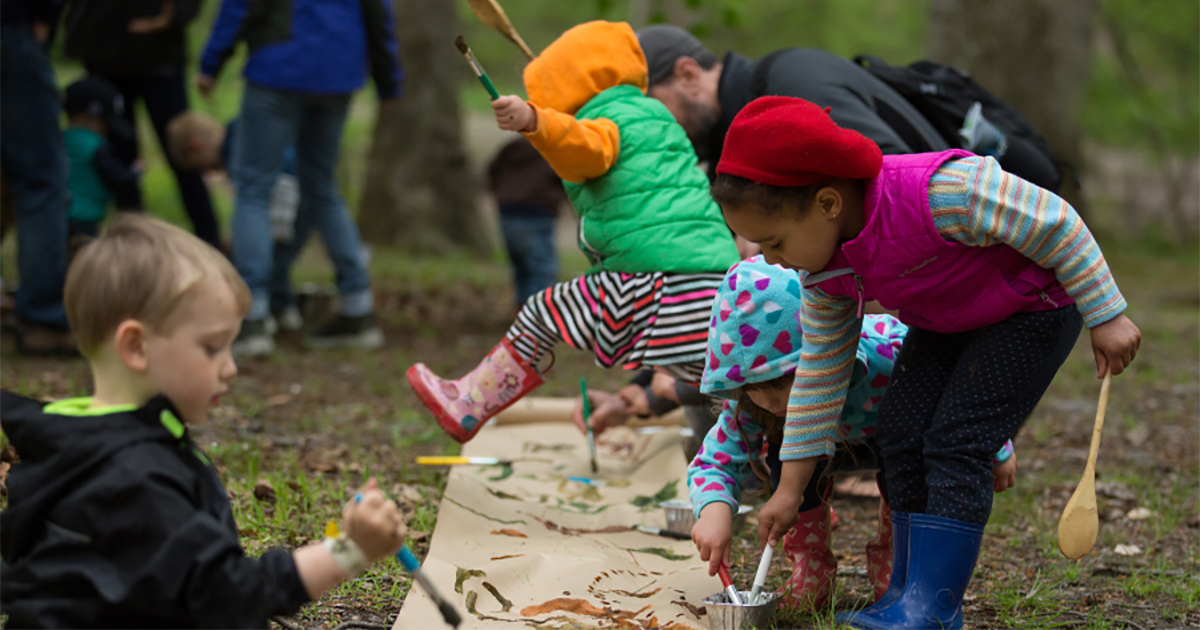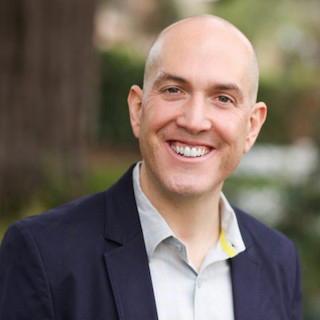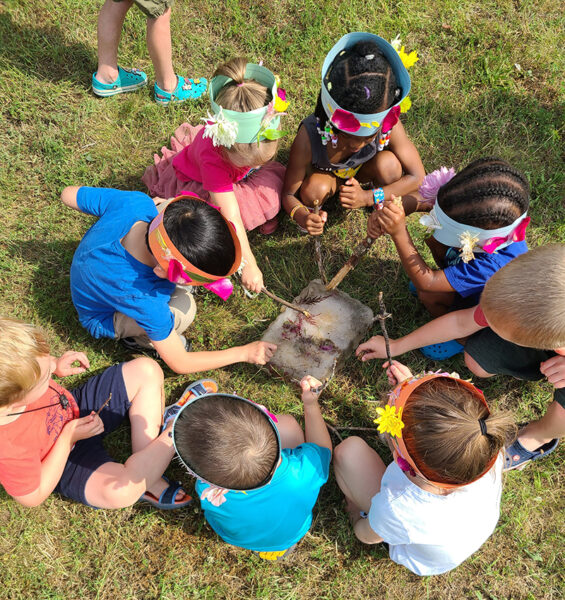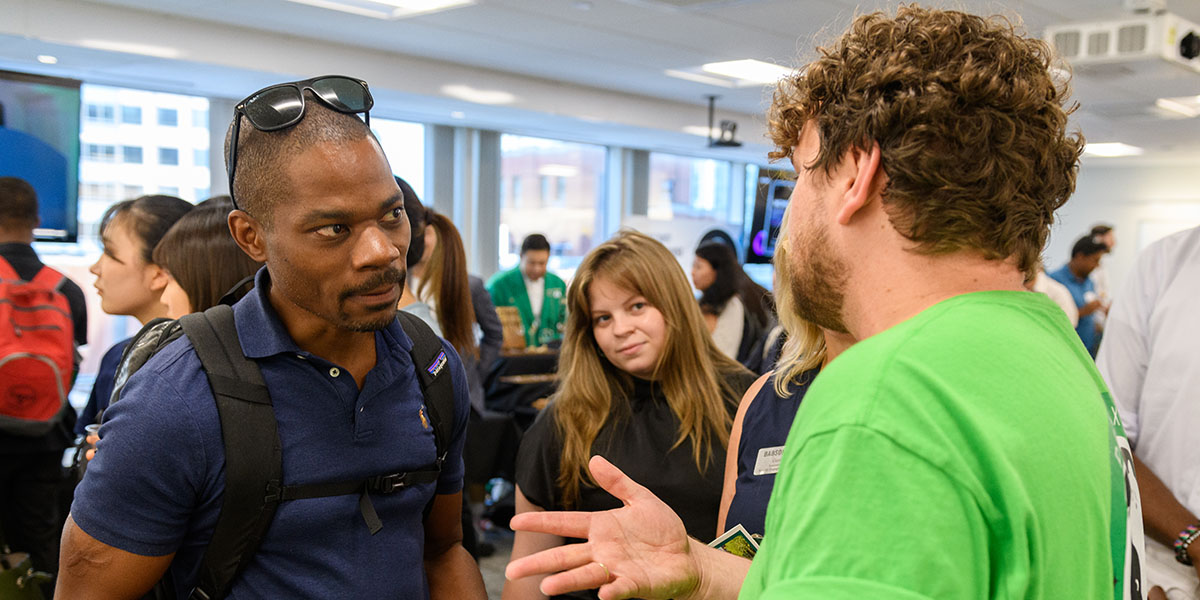What Outdoor Play Taught Me About Entrepreneurship and Human Connection

Brian Fitzgerald ’95 is a product executive and social entrepreneur. He is the co-founder of Tinkergarten, which recently was acquired by Highlights for Children.
More than a decade ago, in the early stages of raising kids, my wife, Meghan Fitzgerald, and I would sit and wonder about the world in which they were growing up. She’s a lifelong educator. I’d spent my career building consumer education technology products and businesses. Though our conversations often meandered toward topics of education, there was one set of trends that kept surfacing: the growing imbalance in children’s lives—a sharp increase in solo screen time, and a decline in time outdoors.

We knew what the research was saying and what our grandmothers had taught us—go outside and play. More importantly, we saw a generation of kids who were at risk. What if we could do something about it?
That became the spark for Tinkergarten.
We built Tinkergarten to help families get outside and learn. We developed a technology platform to train and equip educators with curriculum, tools, and community to lead outdoor, play-based learning classes. Along the way, we built a great business that attracted some of the most influential education, media, and social impact investors, trained thousands of educators, and reached millions of families—all of which resulted in a recent sale of the company to Highlights for Children.
Most importantly, though, I learned a great deal about entrepreneurship, working in service of others, and what it means to tackle hard problems that matter as an entrepreneurial leader. I also gained a multitude of lessons about early child development and the human condition itself.
Reflecting on our experiences and successes, here are five of the main lessons I’ve taken away:
1. It’s All About Balance
As parents, we are told media is the enemy. I learned about media literacy in Dr. Renee Hobbs’ class at Babson, launching me into a career at the intersection of education and technology. So, I knew that narrative was too simple. Screens aren’t inherently bad—some digital experiences can be beautiful, even transformational. And it’s critical for us to teach our kids how to navigate these murky waters and thrive in a digital world.
But, too much screen time isn’t good for anyone. What’s often missing in a modern family’s life is the chance for kids to be outdoors, to move their bodies, to problem-solve, and to play with others face to face. These aren’t luxuries. It turns out they are the very foundations of neurodevelopment, emotional regulation, and social development—and they pave the path for all learning, behavior, and relationships to come.
Both parenting and entrepreneurship require the same kind of balance. You need a bias toward action—but also time to reflect. You can’t do it without digital tools, but it’s imperative to maintain real-world connections. Finding that equilibrium lies at the heart of how to design products, build businesses, raise kids, and even manage our own lives.
2. The Best Data Is What You Can See with Your Own Eyes
At Tinkergarten, we focused dutifully on outcomes. We monitored metrics such as child attention span, affect, and parent-child engagement. But, some of our most powerful insights came not from dashboards but from listening to teachers and parents, and observing kids.
When kids play in nature, something changes. They become more present. They take risks, are eager to solve problems, and find joy in small discoveries. Parents would tell us, “They are asking a lot more questions” or “They opened up in a way I haven’t seen before.” You don’t need a longitudinal study to know that’s good for them.
Sometimes, all the analysis in the world can’t replace what you know to be true when you see it. In entrepreneurship—and in life—there’s real power in trusting your instincts and observing closely.
“Both parenting and entrepreneurship require the same kind of balance. You need a bias toward action—but also time to reflect. You can’t do it without digital tools, but it’s imperative to maintain real-world connections.”
Brian Fitzgerald ’95
3. Real Community Happens Offline
Social media provided Tinkergarten an early growth engine. Parents loved sharing photos of joyful, muddy kids. Our teachers helped each other get started and swapped ideas. But, the true magic—the transformation—happened in person.
Parents came to class and met their tribe. Kids formed relationships that lasted for years. Teachers found a shared mission with other like-minded souls who became friends. And, in that process, something critical emerged: a true pattern of deep, purpose-driven, local community.
We’re living in a time when community is often defined by loosely held digital affinity—liking the same post, joining the same subreddit. But, it turns out that bumping into another parent at the park, sharing a laugh while kids dig in the dirt—that’s a different kind of bond. And, it’s the kind that endures.
4. Outdoor Play Is a Universal Language
We run Tinkergarten classes in city parks, rural farms, church parking lots, and urban rooftops. We’ve seen parents come out of their own shells while observing their kids’ shared, playful joy. Despite all of our differences, this human behavior looks similar no matter where you go. Parents everywhere want their kids to grow up healthy, confident, and connected. That shared desire is what allowed us to scale across all 50 U.S. states and gave our work a unifying purpose.
As entrepreneurs, we often obsess over niche markets and segmentation. That’s important. But sometimes, the best products are those that serve an unmet, universal human need. For us, that was human connection and outdoor play.
5. Attention, Persistence, and Self-direction Are Muscles That Can Atrophy

We live in an era where attention is under siege. But attention is a skill one can train on—as is persistence, collaboration, and curiosity to problem-solve. These are not fixed traits. They are muscles that need to be developed and sustained. These same muscles are what carry kids through adolescence, into adulthood, and beyond. In fact, they’re the same muscles we leverage as entrepreneurs.
When children engage in open-ended, hands-on social experiences, they build these capacities. When they are overly directed—or overly digitized—they don’t get the chance. We saw evidence of this time and time again at Tinkergarten.
Final Thoughts
Growing Tinkergarten has been the most meaningful and humbling journey of my life. It started with a question: Can we help families reclaim something vital? And it ended—at least this chapter—with a community of educators, families, and kids who showed us that yes, it’s possible. But I know our work is not done. Kids today are growing up with an even more complex relationship to media that challenges their healthy development.
In entrepreneurship, we’re taught to focus on product-market fit, monetization, and scale. But, in my experience, some of the more enduring ideas start with something deeper: identifying a critical problem without a clear answer, forming a vision that resonates, and mustering the humility to let go and let the community guide you.
If you’re thinking about building something new, my advice is simple: Step away from your screen. Go outside. Slow down and observe people and the world around you. That’s where you’ll find a true insight.
And, perhaps that’s where your next idea will take root.
Posted in Entrepreneurial Leadership, Insights





